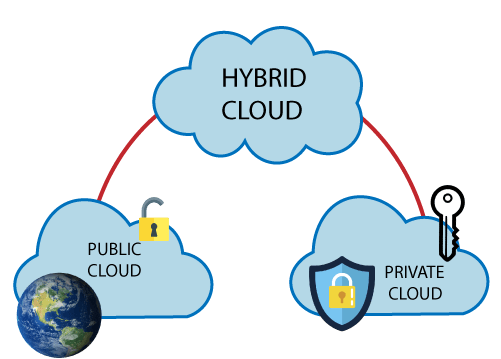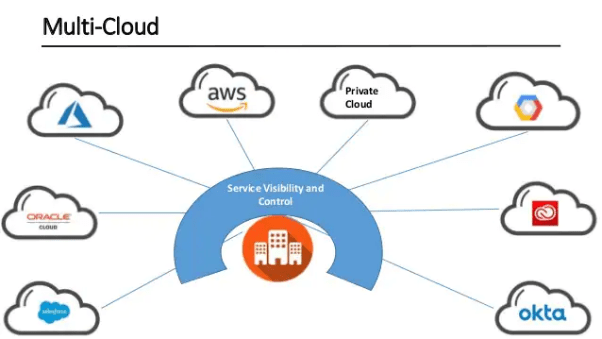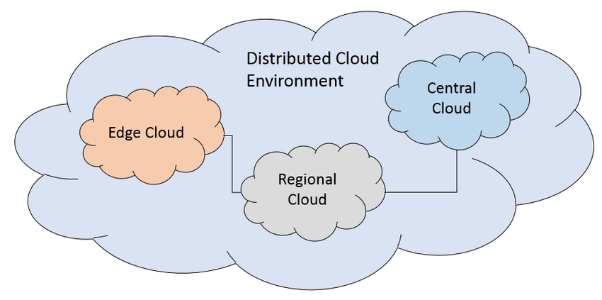Difference between Hybrid Cloud,
Multi-Cloud, and Distributed Cloud

Fascinated by the powerful capacities of cloud technology? Here’s a guide to help you understand where you are in your cloud journey. Take a moment to go through everything you need to know about hybrid, multi, and distribution clouds and the difference between them.
Recently, we have seen a growing number of companies that turned to cloud computing technology for hosting and storing their data. This trending hi-tech solution is offered by cloud service providers such as Amazon Web Services (AWS), Microsoft Azure, and Google Cloud. Whether you run a small or large organization, a cloud system best suits your infrastructure and enables flexible operation for your business at a low cost.
Before you adopt any cloud hosting for your business, it’s best to familiarize yourself with the various types of environments and determine what best suits your company’s infrastructure. Let’s take a look at the three types of cloud environments:
Hybrid Cloud
A hybrid cloud is a type of IT solution that integrates two different cloud resources, either public clouds, private clouds, or a combination of both. In this system, one resource acts as on-premises technology while the other hosts the system.
A hybrid cloud system provides a unified, adaptable, and cost-effective IT solution. Unlike adopting either public or private cloud alone, where your preference for data allocation is restricted, hybrid cloud allows you to choose which data and apps you want to keep confidential and those you wish to be handled by third-party services. This is why over 38% of organizations use a hybrid cloud to deploy essential business applications.
Benefits of Hybrid cloud
- Flexibility: You will be able to take advantage of the cloud providers’ innovative services without having to rely on them.
- Scalability: Because of the public cloud’s versatility, you’ll be able to build an architecture that meets your space, memory, and processing performance requirements. Cloud providers’ implementation and maintenance burdens, on the other hand, will be minimized.
- Security: Using on-premise hosting, you’ll be able to maintain governance and control over your data and production environments while benefiting public cloud services.
- Lower costs: You’ll save money on architecture implementation and application maintenance, and specific storage and processing costs will be reduced.
Regardless of your company’s size or issues, the hybrid cloud might be required at some point if you want to maintain a scalable, adaptable, reliable, and economically sustainable model. However, this technology is well-suited to SMEs and large corporations that can afford a sizable private cloud with private services that make them less vulnerable than in a public cloud. For start-ups, a public cloud is an excellent place to start before investing in other types of cloud environments.
At i95Dev, we can assist you in finding the right cloud strategy for your business irrespective of the size. Let’s start your journey to the cloud today.
Multi-Cloud
These cloud environments differ from hybrids in that they imply the presence and use of multiple clouds without guaranteeing interoperability. This new architecture is gaining popularity because it gives users access to a variety of cloud service models.
Benefits of multi-cloud
- Competitive pricing: since the number of multi-cloud providers keeps increasing, the market’s competition increases, offering business owners the most competitive prices for different resource capacities. You now have the luxury of comparing other offerings by cloud services before deciding on the best option for your business needs.
- Scalability and flexibility: Did you know that 90% of the world’s data was created in two years alone? With this much data being churned out, multi-cloud is an excellent option for your business to store and process data. This is because multi-cloud allows you to sync data in real-time and Automate the process quickly. Multi-cloud also gives you the luxury of scaling your storage space up or down as needed.
- Robust security: When using a multi-cloud system, you don’t have to worry about safety. This is because the providers have to ensure their infrastructure is secure, which guarantees that your organization’s data is protected. Make sure you understand how compatible the multi-cloud applications at your disposal are with the entities in your cloud environment.
- Improved risk management: Business owners looking to adopt a cloud strategy would love the multi-cloud option because it is easy to manage risks. For instance, if one vendor suffers an attack or infrastructure meltdown, you can quickly switch to another provider or back up your system to a private cloud.
If you’re looking to move significant parts of your IT infrastructure to the cloud, then a multi-cloud strategy is well-suited for you. However, as more solutions centered on multi-cloud strategy keep coming every day, you have to be sure that you’re getting the best capabilities across security, networking, application deployment, storage, and management platforms. Our team of experts can help you find the right solution and handle your cloud development and migration needs so you can focus on getting more work done in less time.
Distributed Cloud
In a distributed cloud, you can run public cloud infrastructure in different locations. Not only can you host on your cloud provider’s platform, but you can also use on-premises, third-party data centers, and other cloud provider’s data centers. Plus, it allows you to manage everything from one control plane.
Through this centrally managed, targeted distribution of public cloud platforms, you can run and deploy your business applications or separate application components in a mix of cloud environments and locations that suit your requirements for regulatory compliance, performance, and more.
Benefits of Distributed Cloud
- Saves cost: one of the main benefits of distributed cloud computing is cost-saving, and over 54% of cloud users can attest to that. First of all, you’re saving on infrastructure costs. Then, you’re also saving on the cost of hiring a team to maintain and supervise the hardware.
- Fast deployment: with a distributed cloud service, you can deploy your business applications and collaborate with teams in a matter of clicks.
- Unlimited storage: since you’re hosting on other cloud infrastructure, you don’t have to worry about storage space. Plus, you can expand your storage limit anytime to meet your business needs.
- Data backup and recovery: distribution cloud computing makes it easy to backup and recover files seamlessly in the event of an attack or infrastructure meltdown since you’re using different cloud platforms at once.
The distributed system has various advantages over monolithic systems, which function as single, unified software. A Distribution cloud system would work best for any business that accommodates huge files and requires unlimited storage space. Companies such as online stores, streaming services, and logistic companies are apt for adopting distributed cloud systems.
Following is a table summarizing the difference between hybrid, multi, and distributed cloud:
| Type | Benefits |
| Hybrid cloud |
The ability to scale on demand Ability to modernize user experiences in the cloud while keeping historical assets on-premises Take advantage of the cloud providers’ innovative services without having to rely on them. Govern and control your data and production environments while benefiting public cloud services. Save money on architecture implementation and application maintenance. |
| Multi-cloud |
Sync data in real-time and Automate the process quickly Utilize the cloud to handle your increased data load. For developing applications, avoid vendor lock-in. Competitive pricing allows you to compare price offerings by cloud services and decide the best option for your business needs. |
| Distribution cloud |
Get access to unlimited cloud storage space Manage and calculate resources from a single central location. Save cost |
Conclusion
Now that you know the different cloud strategies and their benefits, choosing the best fit for your business needs would be easier. If you still can’t decide which one to go for, we can help you find the right one for your business and get you started in no time. Get in touch with us today.
Recent Blogs
Understanding Shopify Pricing Plans and TCO for an eCommerce Store
Understanding Shopify Pricing Plans and TCO for an eCommerce Store Author Category Share Shopify is one of the most adopted eCommerce platforms, offering rich features and designed to...
Omnichannel Retail – Definition, Significance, Benefits, and Use Cases
Omnichannel Retail – Definition, Significance, Benefits, and Use Cases Author Category Share The retail landscape is highly competitive due to technological advancements and changing...
Understanding BigCommerce 2024 Pricing and TCO for an eCommerce Store
Understanding BigCommerce 2024 Pricing and TCO for an eCommerce Store Author Category Share Starting an online store with BigCommerce is an exciting venture. As with any significant business...







